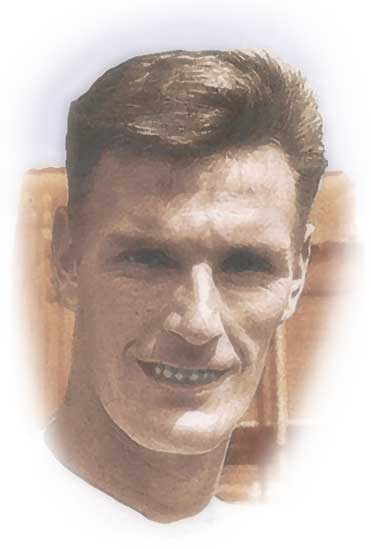 Alan
Peacock was among the unluckiest of all footballers, losing the best of
his playing days to a succession of crippling knee injuries. If he had
remained fit, it might well have been Peacock rather than Geoff Hurst
who spearheaded England's World Cup winning line-up in 1966 - he had been
added to the England set-up by Alf Ramsey in late 1965 when he was on
top form for Leeds. He scored his third goal in six games for his country
and seemed to be set fair for an exciting 1966.
Alan
Peacock was among the unluckiest of all footballers, losing the best of
his playing days to a succession of crippling knee injuries. If he had
remained fit, it might well have been Peacock rather than Geoff Hurst
who spearheaded England's World Cup winning line-up in 1966 - he had been
added to the England set-up by Alf Ramsey in late 1965 when he was on
top form for Leeds. He scored his third goal in six games for his country
and seemed to be set fair for an exciting 1966.
As it was, Peacock slipped into the shadows after more injuries. He
dropped into the Second Division with Plymouth Argyle for whom he played
a mere 11 games before surrendering to the inevitable and retiring at
just 30.
He took his tribulations with amazing fortitude. Johnny Giles: 'I rated
Peacock highly. Quite apart from his heading power, he was an accurate
passer of the ball, and one of the most astute positional players I have
seen. Peacock also had a wonderful sense of humour. He suffered badly
with cartilage trouble not long after joining Leeds, which ruled him out
of the game for long periods. But I never once heard him complain or walk
around with a frown on his face. And if anyone tried to show him any sympathy
he would reply: "Look, if I didn't have both cartilages missing I
would be half a stone heavier!"'
Former England manager Walter Winterbottom described Peacock as 'the
finest header of a ball in the country', and he was indeed deadly in the
air. His height, strength and bravery (some might say recklessness) made
him a rare handful for opposing defenders.
He provided the threat up front that Leeds
manager Don Revie desperately needed and United's tactics relied heavily
on Peacock's willingness for a fight, as they launched a stream of crosses
into the penalty area. Andrew Mourant: 'He was an excellent team player,
always on hand to link up with play, though sufficiently aware of his
modest skills on the ball not to try things beyond him.
'Much of Peacock's bravery went unseen save by colleagues and the Leeds
management. Such was his commitment to the cause, he all too frequently
launched himself into dangerous places where bodies were thrashing and
boots flying. He had a succession of cartilage operations, doing his utmost
to regain fitness each time. Yet such was his luck, his knee gave out
sooner or later. Lesser men might have had bouts of black despair but,
if Peacock grieved, he did so privately. He is remembered for his good
cheer and humour in trying circumstances. Without him, the Leeds forward
line was a blunter instrument.'
Norman Hunter: 'Alan led the front line so well and was a great header
of the ball. Despite having dodgy knees he was still a very fit man. In
the gym the weights he could lift were amazing. I could hardly move them
while he lifted them with ease. I remembered having played against him
and thinking what a good player he was, so I was delighted when we bought
him.'
Born on 29 October 1937 in Middlesbrough, Alan 'Peachy' Peacock joined
his hometown team in November 1954 as a gangling inside-forward and
made his debut a month after turning 18. After being selected for the
England youth team, he established himself midway through the 1957/58
season and forged a productive striking relationship with prolific centre-forward
Brian Clough.
back to top
Clough, Peacock's senior by two years, was the higher profile player
with some phenomenal goalscoring feats during the late Fifties. He was
Boro's top scorer in five successive seasons between 1956 and 1961,
with a lowest League total in any season of 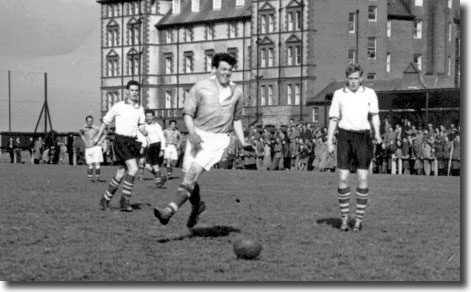 34!
34!
They were like chalk and cheese: Peacock, the selfless team player, endlessly
loyal to club and colleagues; Clough, arrogant, abrasive and selfish.
As Old Big 'Ead used to say: 'Get that f***ing ball over to me. I'm here
to put it into the net, not you.'
Peacock: 'We go back years and years. We first met in 1954. He was 19
and I was 17. He was in the RAF and I was in the steelworks. But he was
a terrific goalscorer, one of the best. When we first started at Middlesbrough
we just seemed to start well and we went from there. From one season to
another we just got better and better … we enjoyed a great partnership.'
Peacock was a willing and able provider and the two seemed an ideal
combination, a goalscoring marriage made in heaven. The pairing was
razor sharp, one of the club's most prolific of all time. Between them
they managed 262 League goals during their years together at Ayresome
Park.
The duo's biggest haul came in the 1958/59 campaign when they scored
62 - including an incredible 43 goals in 42 league appearances for Clough.
Boro kicked off the season in the way that they were to continue, with
a 9-0 hammering of Brighton, Clough snatching five and Peacock two. In
another memorable game in November, both men grabbed hat tricks in a 6-1
victory against Scunthorpe United.
Boro were in good form that month, thrashing Derby 5-0 with Peacock netting
the third. The following August, the same teams met at the Baseball Ground
and the Teessiders did even better, winning 7-1. Clough was not on the
score sheet, but Peacock netted four times. Wilf Shaw writing in the Derby
Evening Chronicle: 'My eyesight is quite good and I saw what happened
clearly, but somehow I telephoned Clough and not Peacock as the scorer
of Boro's second goal. I apologise for the weekend arguments unwittingly
caused, and to lanky four-goal National Serviceman Peacock. One can rave
about 20-year-old Peacock. He was a craftsman with the killer instinct
in front of goal. The goal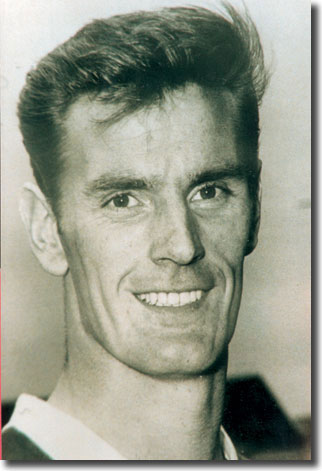 I misread was the perfect example of wonderful split-second opportunism.'
I misread was the perfect example of wonderful split-second opportunism.'
In November 1960 came another incredible game, 6-6 at Charlton - another
Clough hat trick, a trio from the Addicks' Dennis Edwards and Charlton
levelling the game for the fifth and final occasion a minute from time.
Clough left Middlesbrough for Sunderland in July 1961 in a £42,000 deal,
sick of the team's inept defensive performances. He wrote in his autobiography:
'It was not long before I told [Middlesbrough manager] Dennison I wanted
out … my patience snapped. Middlesbrough were letting them in quicker
than I could score them. I told the manager I was sick and tired of banging
goals in at one end, only to turn round and see the team conceding even
more at the other.'
Peacock kept up the good work the following season, assuming the No 9
role with enthusiasm, and returned an impressive 32 goals in 41 games.
Bob Dennison said of him, 'Alan is a top class striker. His workrate is
magnificent, he shields the ball so well and as well as scoring goals
he is unselfish and a real team player.'
His record brought Peacock to the attention of England manager Walter
Winterbottom as the 1962 World Cup finals neared. Wearing the No 19
shirt, he took his place in a squad that boasted such illustrious names
as Jimmy Armfield, Bobby Moore, Jimmy Greaves, Bobby Charlton and Johnny
Haynes.
He was yet to make his debut as the squad flew out to Chile, but Winterbottom
had no doubts about blooding the 24-year-old. He made his debut in England's
second game, against Argentina in Rancagua after Gerry Hitchens turned
in a lacklustre performance in the opener, a disappointing 2-1 defeat
to Hungary.
Peacock lined up as centre-forward alongside Greaves, with Haynes pulling
the strings from midfield. Charlton on the left wing and Blackburn's
Bryan Douglas on the right supplied the ammunition.
back to top
Peacock got off to a bright start, firing wide early on, then forcing
the penalty that earned England the opening goal after 17 minutes. A
cross from Charlton floated invitingly to the far post where Peacock
powered a header goalwards only for Argentina captain Navarro to turn
the ball over with his hand. The Russian referee pointed to the spot
and Ron Flowers drove home the penalty.
Jimmy Armfield hit a post soon after, then Charlton fired in a sizzling
low shot for a second just before the interval as England took control.
In the second half England sat deeper and soaked up a lot of Argentinian
pressure but Peacock worked hard, closing down defenders and chasing
back to help the defence. And he had a hand in England's third on 66
minutes 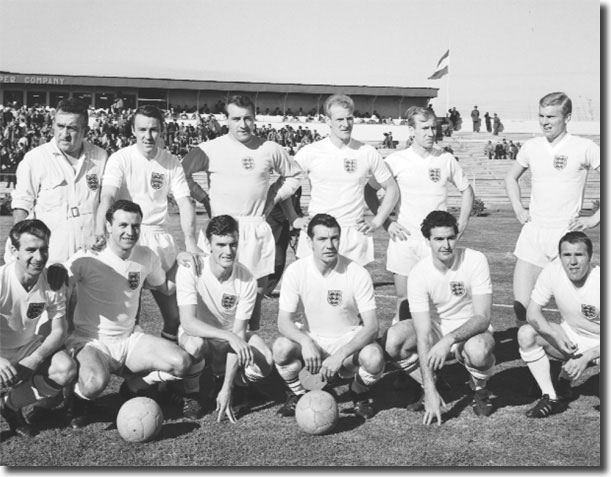 when
he pushed a first time ball out wide for Douglas to get down the flank
and put in a fierce cross shot. The keeper could only punch away as
far as the edge of the box where the lurking Greaves pounced to drill
home.
when
he pushed a first time ball out wide for Douglas to get down the flank
and put in a fierce cross shot. The keeper could only punch away as
far as the edge of the box where the lurking Greaves pounced to drill
home.
Argentina pulled one back through Sanfillipo ten minutes from time
but Peacock had done enough to keep his place for the final group game
with Bulgaria five days later. He had less chance to shine as the Bulgarians
defended in depth from the off and set out to frustrate and intimidate
with a very physical approach. In a rare first half break Greaves rounded
the keeper but hit the upright.
The second half was just as drab but Peacock almost notched his first
England goal on the hour as Flowers crossed into a crowded box. Peachy
climbed highest to send a looping header over the keeper but it clipped
the post before going behind for a goal kick.
The Argentinians in the crowd were whistling with disdain and booing
the turgid fare as the game sleepwalked towards the draw that would
put both sides through at the South Americans' expense.
Peacock was selected for the quarter final against holders Brazil but
suffered a stomach upset overnight and was replaced by Hitchens. Brazil
won the game 3-1 and went on to retain the trophy.
Peacock featured again in two autumn internationals, a 3-1 win against
Northern Ireland and a 4-0 hammering of Wales in Winterbottom's final
match in charge. Peacock snatched two goals in the latter game, one
of them a wonderful drive from the right hand side of the area. Alf
Ramsey was among the crowd of 27,500 - the lowest ever for a Wembley
international - in readiness to take over as England manager.
With Winterbottom's departure, Peacock slipped out of the international
reckoning, though he scored 21 goals in 40 Second Division appearances
in 1962/63. One memorable performance saw him score twice as Middlesbrough
pulled off a remarkable 5-4 win at Plymouth in February.
The previous month manager Bob Dennison had left Ayresome Park after
nine years of struggling unsuccessfully for promotion to be replaced by
former England inside-forward Raich Carter.
Because of the bitter winter that year the Plymouth game was Boro's first
for six weeks, only playable because of the milder conditions prevailing
in the West Country.
After the victory, Carter said, 'No player who can assist the club to
win promotion will leave. That is definite and includes Alan Peacock.'
Middlesbrough enjoyed a strong closing run but ended the season 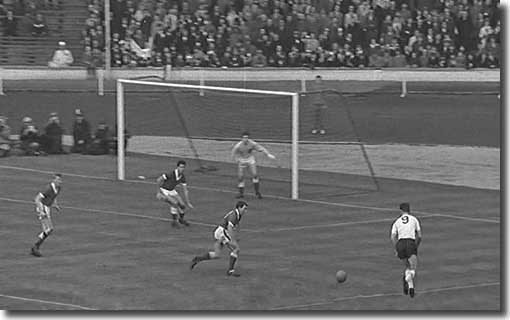 fourth.
fourth.
back to top
Boro made a promising start to the following campaign, winning four of
the first five games, scoring 18 goals and conceding just four. During
that time, Peacock's delightful 87th-minute headed effort provided the
decisive moment in a 3-2 win away to Leeds United, featuring John
Charles in the wing-half role that he occasionally filled. Bill Mallinson
in the Yorkshire Evening Post: 'England's World Cup leader had
a thin time until the last 12 minutes against the wide-awake Charlton,
but Peacock, like his predecessor, Clough, has that instinct for the pay-off,
and the decider came from as good a piece of work in the air as I have
seen for a long time.'
Middlesbrough slumped as winter drew on with both Peacock and winger
Bobby Braithwaite out injured. The striker suffered a series of knee
problems, culminating in the requirement for a cartilage operation on
his left knee in November 1963.
Three months later Leeds United manager Don Revie signed Peacock for
a fee in excess of £50,000, set to rise to £55,000 if United secured promotion.
The deal was a record for both clubs. Revie said at the time, 'I have
always been impressed by Peacock, whose goal record speaks for itself.
Naturally we hope that he will do for United what he has done for Middlesbrough.
He is a perfect type and undoubtedly will settle down well at Elland Road.'
Rob Bagchi and Paul Rogerson in The Unforgiven: 'In
normal circumstances he would have been far beyond Revie's resources.
Memorably described by Brian Glanville as "a tall, straight guardsman-like
figure even to the short haircut", he was just over 6ft tall, yet
his timing and vertical leap placed him up with Tommy Taylor, John Charles
and Nat Lofthouse as the finest exponents of the aerial arts since the
maestro Tommy Lawton. His pedigree did not augur well for the club's bank
manager, especially since Peacock was only twenty-six. Eighteen months
earlier, Denis Law had signed for Manchester United from Torino for £115,000,
and while Peacock, splendid player though he was, was not quite in Law's
class, he should easily still have been above Leeds' price bracket. Luckily
for Leeds, the discount on "damaged goods" also applied in football.
Peacock's persistent knee problems and recent serious cartilage operation,
a career-threatening procedure back in 1963, meant that Middlesbrough
were resigned to cashing in on the player while they could.'
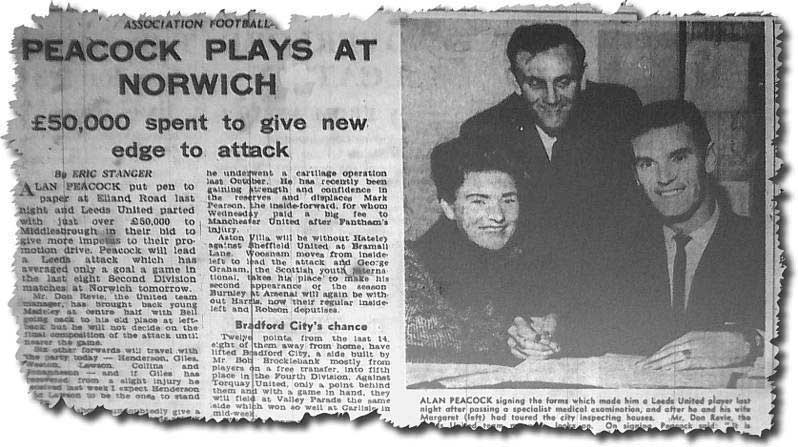 Despite
the club's £80,000 overdraft, Revie was prepared to gamble on Peacock's
fitness to boost a faltering Second Division title challenge. Peachy had
only managed nine Second Division appearances and a couple more in the
League Cup, but had scored 8 times.
Despite
the club's £80,000 overdraft, Revie was prepared to gamble on Peacock's
fitness to boost a faltering Second Division title challenge. Peachy had
only managed nine Second Division appearances and a couple more in the
League Cup, but had scored 8 times.
United were desperate for goals, and Eric Stanger wrote in the Yorkshire
Post: 'Peacock should undoubtedly give a new cutting edge to this
Leeds attack which has been so badly blunted of late. On his day there
are few better centre-forwards in the country and apart from being exceptionally
clever in the air, where he makes full use of his height of six feet,
he has a strong shot. But more than that, he is one of those centre-forwards,
not plentiful in the modern game, who can hold a line together by his
distribution from midfield. He should, too, fit easily into Mr Revie's
team plan of the twin thrust down the centre, whether he has Weston
or Lawson alongside.'
back to top
Peacock took a while to find his form, though he managed a score in his
first appearance, at Norwich. Phil Brown in the Yorkshire Evening Post:
'Peacock obliged a touch of the ideal, a goal on his debut, beautifully
snapped with his head. But he obliged a lot more by the rest of his keen
play against a strong, well timbered defence out to mark him, and led
by one of the best centre-halves in the Division these last few years,
Barry Butler. Allowed not a single full chance - he scored off half a
chance - Peacock probed hard and thoughtfully.'
Peacock managed another goal on his return to Ayresome Park in mid March,
emerging from a ruck of players to head Leeds into the lead in the 86th
minute before Johnny Giles completed a 3-1 scoreline three minutes later.
It took some time for Peacock and his new teammates to adapt to each other.
Ian W Guild, after a narrow home win against Scunthorpe in February: 'Peacock,
making his first appearance at Elland Road, has the right ideas at centre-forward,
but his colleagues have either still to fathom them, or are not clever
enough to do so. Perhaps it was because Collins had an off day that the
forwards fell into their old habit of passing aimlessly from one to the
other instead of thrusting at goal.'
Things eventually started to gel with Albert
Johanneson and Giles providing better service, capitalising on Peacock's
aerial prowess to bring a new sharpness to United's game. The centre-forward
netted 8 times in 14 appearances as Leeds gathered momentum during the
run in. His two goals in a four-minute spell earned 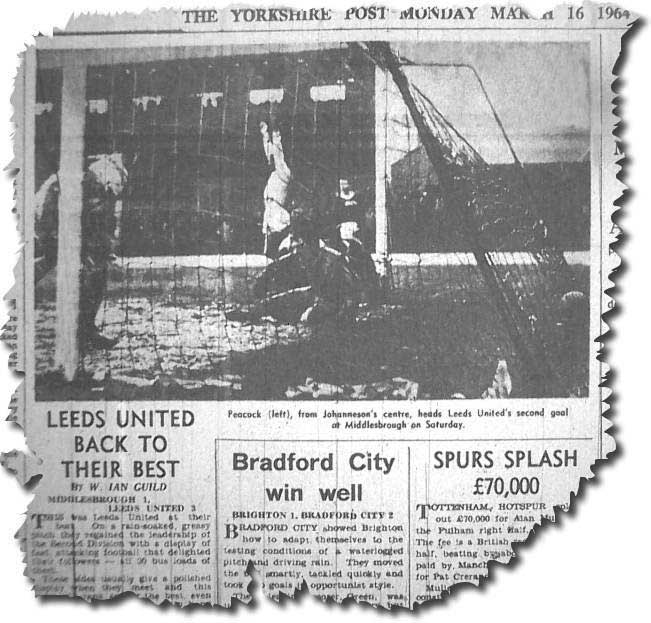 United
the 3-0 victory at Swansea on 11 April
that confirmed their promotion (Phil Brown described it as 'his best match
yet') and he got another brace at Charlton as they secured the title.
United
the 3-0 victory at Swansea on 11 April
that confirmed their promotion (Phil Brown described it as 'his best match
yet') and he got another brace at Charlton as they secured the title.
During a summer tour of East Germany, Peacock injured his right knee.
He aggravated the problem in training and missed the first two months
of the 1964/65 season after a
cartilage operation. Revie: 'I'm very sorry for Alan, who was so keen
to do well in the First Division for us, and we all wish him the best
and speediest of recoveries.'
Peacock made his comeback in the Central League against Bolton in November
but broke down after 20 minutes with a recurrence of his knee injury,
necessitating a second operation.
In his absence, United impressed during their First Division comeback
and were soon up among the leaders. Peacock was back on the goals trail
after returning to the side in February, scoring six goals in 10 games,
plus a brace in an FA Cup-tie against Crystal Palace. Bagchi and Rogerson:
'All winter Revie had remained steadfast in his decision to wait for Peacock's
return before admitting that Leeds could win anything … Fortuitously,
after several frustrating delays, Peacock finally re-emerged … His presence
revitalised Revie's team as an attacking force, knitting the whole side
together with his precise and intelligent play. Significantly in the ten
League games he managed to play in all season, the team scored 27 goals
compared to the 56 they scored in the thirty-two games he missed. Put
another way, he was worth a goal a game more to the team when he played.'
Like most of his team mates, Peacock had a game to forget in the FA
Cup final defeat to Liverpool, and was outjumped, outfought and
outmanoeuvred for the most part by the Reds' towering skipper and centre-half,
Ron Yeats. His inadequacy left United toothless, unable to get a foothold
in Liverpool's half.
The striker was back to his best at the start of the 1965/66
season. He showed sparkling form and returned nine goals in his first
16 games, including the winner in United's first European tie, at home
to Torino at the end of September. Peacock was switched to No 7 in Don
Revie's gimmicky attempt to unsettle the Italians. Phil Brown: '[Peacock]
was being tailed everywhere by two men, even when 50 yards from the ball,
and last night there was not another good finisher in United's forwards.
Peacock did wonderfully well to head home from a brilliant passing round
three minutes after half time.' The goal put United two up before Torino
pulled one back late on. He had a second effort disallowed when the referee
ruled that Italian keeper Vieri had cleared another header before it crossed
the line. Peacock afterwards claimed the ball 'was a good 18 inches over
the line'.
back to top
His form at the time was first class, as good as at any time in his career,
and it was no surprise when England manager Alf Ramsey recalled Peacock
to the England side for a match at Wembley against Wales in early October.
Peacock was said, by one source, 'to have come out of the wilderness'.
Everyone at Elland Road was delighted for one of the most popular players
at the club and Phil Brown paid glowing tribute in the Yorkshire Evening
Post: 'Peacock had four caps for England already … but this is the
one he will prize above all … his last cap was in 1963, and since then
he has had a gruelling fight against recurrent 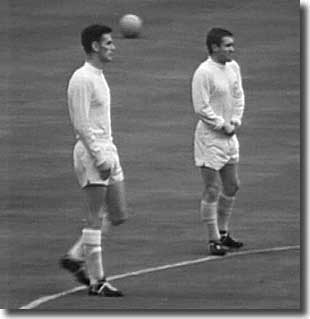 knee injuries. Last season
because of them, he did not start to play at all until February, and had
his first senior match only on February 27 against Spurs in London. While
playing more than usefully he understandably did not pull up any trees
last season but this season he has been in brilliant form - dashing, alert,
ready with head or foot, and always with brilliant and tenacious heading.
He has scored six goals so far. Last season he ground away, day after
day, Sundays as well, at rehabilitating exercises for his legs.'
knee injuries. Last season
because of them, he did not start to play at all until February, and had
his first senior match only on February 27 against Spurs in London. While
playing more than usefully he understandably did not pull up any trees
last season but this season he has been in brilliant form - dashing, alert,
ready with head or foot, and always with brilliant and tenacious heading.
He has scored six goals so far. Last season he ground away, day after
day, Sundays as well, at rehabilitating exercises for his legs.'
Peacock acknowledged the support of everyone at the club, saying: 'They
have been great, for without the continued help of such as Les Cocker
and Syd Owen I might never have got back to peak fitness. Now I feel better
than I've ever felt. Naturally I am pleased with my selection. Who wouldn't
be? But it was something of a surprise.'
When asked if he had felt that his England playing days were over, Peacock
added, 'No, not really, for I have now got back some of that old edge
to my game, the result of being pushed all the time by the training staff.'
Manager Don Revie expressed his pleasure, tinged with relief that Peacock
finally looked to have put his problems behind him, saying, 'I couldn't
have been more pleased had I been selected myself. It is tremendous compensation
for the courage and determination which Alan has shown in his fight back
to fitness when people were saying he was finished and that we had bought
a boner.'
The game was a dour goalless draw. Fielding six players from outside
the First Division, Wales managed to prevent England from scoring for
the first time in thirty-three years. They had the most productive player
on the pitch in balding, 35-year-old Ivor Allchurch, an artist of a
player with a beautiful range and weight of pass even now that he was
seeing out his dotage in the Third Division with Swansea.
Peacock missed the 3-2 defeat to Austria three weeks later through
injury, but was recalled for the game against Northern Ireland on 10
November. Joe Baker, deputising for the hospitalised Jimmy Greaves,
put England ahead in the nineteenth minute. The Irish equalised sixty
seconds later when Willie Irvine turned a George Best centre through
the legs of an embarrassed Gordon Banks. Persistent rain made the surface
treacherous, and the Irish defenders were slithering around when Peacock
scored England's winner in the 73rd minute, capitalising on an attempt
from Baker to hook the ball home from close in.
The striker lost his way a little for Leeds in the weeks that followed,
as the Yorkshire Post's Eric Stanger noted after a home defeat to Liverpool
on 28 December: "Peacock has lost all that early season determination
which won him back an England place. He has not scored since October
23, nor is he making much play for his colleagues. Yesterday his challenge
to Yeats 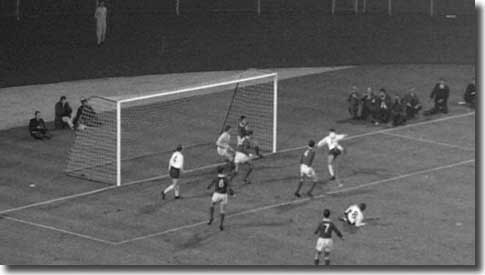 was
never much more than nominal."
was
never much more than nominal."
When Leeds beat Bury 6-0 in the FA Cup third round on January 22, Stanger
was equally concerned, saying, "Leeds had one worry … That was the continued
and startling loss of form by Peacock. Again he could scarcely put head
or foot right and this on a day when all his colleagues were doing very
much as they wished. He is not the same man who began the season with
such zest."
A week later there was even worse news when Peacock was stretched off
during a 2-0 defeat at Sunderland. In the 27th minute, with United a
goal down, he tried to head home a cross from Albert Johanneson and
got his legs locked with those of a defender. He went down heavily and
had to be carried off.
The news was bad - Peacock had more ligament damage in his right knee.
At first it was thought that he would only be out of action for a few
weeks, but his troubles persisted and he went into a Leeds nursing home
at the beginning of March for another operation. That was the end of
his season and it was September before he was fit enough for a recall
after requiring more surgery during the close season.
He scored the only goal in a League Cup-tie against Newcastle on 13 September
1966, marking his return 'with a characteristic header as powerful as
it was accurate' (Stanger) and planting another onto the bar. The crowd
gave him a standing ovation.
back to top
He missed the following game with a bruised ankle but made a long awaited
League return in a draw against Everton on 24 September.
Sadly, his return lasted just three games and Peacock was out of first
team action from October 4 to March 25. He then scored twice in three
games, but limped out of an FA Cup quarter-final against Manchester City
with a thigh strain.
It might have been thought that would be the end of a sad season, but
Peacock was selected and did splendidly as a stand in centre-half for
the final league game, a meaningless encounter with Sheffield Wednesday.
Don Revie selected a line-up composed almost entirely of reserves.
Sadly, that was to be Peacock's final appearance in United's first-team.
He made some appearances for the reserves, but knew the writing was on
the wall when Don Revie paid out a club record £100,000 to sign England
centre-forward Mick Jones from Sheffield United in September 1967.
Peacock chose to move on to Second Division Plymouth Argyle in a £10,000
deal at the beginning of October, making his debut on the 7th in a 1-1
draw against Huddersfield, as reported in the Yorkshire Post: 'Plymouth's
new centre-forward, Alan Peacock, the man who was written off as England's
attack leader after three serious knee operations, did not set the Home
Park stands ablaze with excitement. Nobody expected that he would after
such a long lay off. But with a header that was cleared off the line,
a shot that rattled the crossbar and a return pass to inside-forward colleague
Reynolds that levelled the scores he did enough to make Plymouth supporters
feel a good deal happier 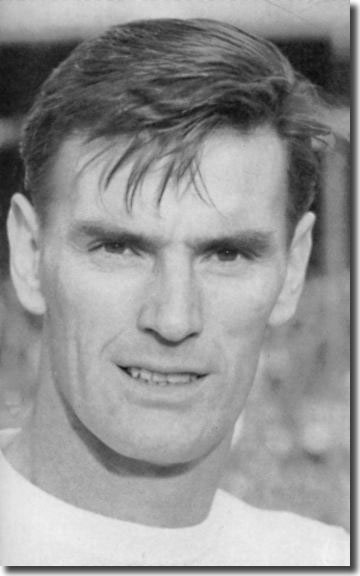 about
Argyle's future prospects.
about
Argyle's future prospects.
'A lot rested on Peacock's shoulders in this match. Plymouth had not
gained a point since August 28 and scored only one goal. Peacock's play
was determined and gave considerable satisfaction, but at the same time
Mielczarek, Town's new centre-half from Wrexham, was just as impressive.
It is in the air that Peacock has always been most dangerous and in this
match the rugged Mielczarek limited him to no more than three headers
at goal.'
After two games, the striker limped off with more knee trouble, but
was out for just a fortnight.
Peacock's first goal for the Pilgrims came in his fifth match, on December
2 in a 3-1 win against Carlisle, but Plymouth were struggling at the foot
of the table and were soon having to cope without their new man. Following
his eleventh appearance, on 20 January against Derby, the former England
man was given medical advice that he should retire from playing, aged
just 30. It was heartbreaking news.
After such a depressing end to his playing days, it would have been
perfectly understandable for Peacock to have descended into self pity,
like so many other ex-players, but that was not his style. He returned
to his hometown and became an active behind-the-scenes stalwart at Middlesbrough,
for a time also running a newsagent's business.
He worked as a match day host at the Riverside and founded the Middlesbrough
Former Players' Association in 2005, gaining the inspiration from attending
similar events at Elland Road and White Hart Lane. The Association continues
to identify and help the club's former players in addition to raising
funds for local charities.
Peacock: 'The former players' association is going really well and it's
great to be able to invite some of the old players along to Riverside.
We had Rolando Ugolini and Arthur Fitzsimons there the other day and not
only was it great to see how much they enjoyed it, but what a wonderful
reaction they got from the fans. But that's not just why we are doing
it. We want to do what we can for some of those old players who did not
always have things easy when they finished their playing careers.
'I was fortunate but there were many lads from my era, particularly in
the Durham area, who were household names but had to go down the mines
to makes ends meet once their professional careers were over. You don't
forget things like that. But there are needy people in all walks of life
and it's great to be able to give a little bit back through our charities.
All I have ever done throughout my life is want to play football and be
involved with football. But there is more to life than football and it's
such a pleasure to be able to give something back.'
In November 2005, Peacock became president of non-;eague Guisborough
Town and in December 2006 he was awarded a Lifetime's Achievement Award
by the Evening Gazette in Middlesbrough for his services to the
club, a fitting tribute to one of the nicest but unluckiest men in football.
back to top











 Alan
Peacock was among the unluckiest of all footballers, losing the best of
his playing days to a succession of crippling knee injuries. If he had
remained fit, it might well have been Peacock rather than Geoff Hurst
who spearheaded England's World Cup winning line-up in 1966 - he had been
added to the England set-up by Alf Ramsey in late 1965 when he was on
top form for Leeds. He scored his third goal in six games for his country
and seemed to be set fair for an exciting 1966.
Alan
Peacock was among the unluckiest of all footballers, losing the best of
his playing days to a succession of crippling knee injuries. If he had
remained fit, it might well have been Peacock rather than Geoff Hurst
who spearheaded England's World Cup winning line-up in 1966 - he had been
added to the England set-up by Alf Ramsey in late 1965 when he was on
top form for Leeds. He scored his third goal in six games for his country
and seemed to be set fair for an exciting 1966. 34!
34! I misread was the perfect example of wonderful split-second opportunism.'
I misread was the perfect example of wonderful split-second opportunism.' when
he pushed a first time ball out wide for Douglas to get down the flank
and put in a fierce cross shot. The keeper could only punch away as
far as the edge of the box where the lurking Greaves pounced to drill
home.
when
he pushed a first time ball out wide for Douglas to get down the flank
and put in a fierce cross shot. The keeper could only punch away as
far as the edge of the box where the lurking Greaves pounced to drill
home. fourth.
fourth. Despite
the club's £80,000 overdraft, Revie was prepared to gamble on Peacock's
fitness to boost a faltering Second Division title challenge. Peachy had
only managed nine Second Division appearances and a couple more in the
League Cup, but had scored 8 times.
Despite
the club's £80,000 overdraft, Revie was prepared to gamble on Peacock's
fitness to boost a faltering Second Division title challenge. Peachy had
only managed nine Second Division appearances and a couple more in the
League Cup, but had scored 8 times. United
the 3-0 victory at Swansea on 11 April
that confirmed their promotion (Phil Brown described it as 'his best match
yet') and he got another brace at Charlton as they secured the title.
United
the 3-0 victory at Swansea on 11 April
that confirmed their promotion (Phil Brown described it as 'his best match
yet') and he got another brace at Charlton as they secured the title. knee injuries. Last season
because of them, he did not start to play at all until February, and had
his first senior match only on February 27 against Spurs in London. While
playing more than usefully he understandably did not pull up any trees
last season but this season he has been in brilliant form - dashing, alert,
ready with head or foot, and always with brilliant and tenacious heading.
He has scored six goals so far. Last season he ground away, day after
day, Sundays as well, at rehabilitating exercises for his legs.'
knee injuries. Last season
because of them, he did not start to play at all until February, and had
his first senior match only on February 27 against Spurs in London. While
playing more than usefully he understandably did not pull up any trees
last season but this season he has been in brilliant form - dashing, alert,
ready with head or foot, and always with brilliant and tenacious heading.
He has scored six goals so far. Last season he ground away, day after
day, Sundays as well, at rehabilitating exercises for his legs.' was
never much more than nominal."
was
never much more than nominal." about
Argyle's future prospects.
about
Argyle's future prospects.